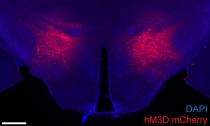Substance use disorders are related to dysfunction in the brain’s motivational and reward processes, so understanding how the brain’s reward system works is key to finding new therapies. Scientists at NIDA’s Intramural Research Program (IRP) have identified a population of neurons engaged in compulsive food seeking, which, like substance use, engages the brain’s reward circuit, including the ventral tegmental area (VTA) and the lateral hypothalamus (LH). The LH has been known to play a fundamental role in regulating feeding and reward-related behaviors. This study was aimed at examining how specific cell populations within the LH—leptin receptor-expressing neurons (LHLEPR)—regulate motivation in mice.
The scientists trained mice to lever-press for food pellets on a progressive ratio schedule, a model commonly used to assess motivation to obtain a reinforcer. Using chemicals specifically designed to manipulate those neurons, the investigators found that activation of LHLEPR cells intensified the response, resulting in more food seeking, while inhibiting them decreased the response. Then, using optogenetics (light) to manipulate the neurons, they found that activation of the pathway between the LHLEPR and VTA also promoted motivation for food. The investigators then discovered that LHLEPR cells regulated the motivation to obtain water, suggesting that they may play a generalized role in motivation essential for survival. Together, these results identify LHLEPR neurons as modulators within the reward circuit that gate the brain’s motivational urges.
These findings advance our knowledge of the brain’s reward pathway and suggest LHLEPR neurons as a potential target of novel therapeutics for eating disorders, substance use disorders and other conditions related to dysregulated motivational processes.
Study:
- Felipe L. Schiffino, Justin N. Siemian, Michele Petrella, Brenton T. Laing, Sarah Sarsfield, Cara B. Borja, Anjali Gajendiran, Maria Laura Zuccoli, Yeka Aponte. Activation of a lateral hypothalamic-ventral tegmental circuit gates motivation. PLoS One.

